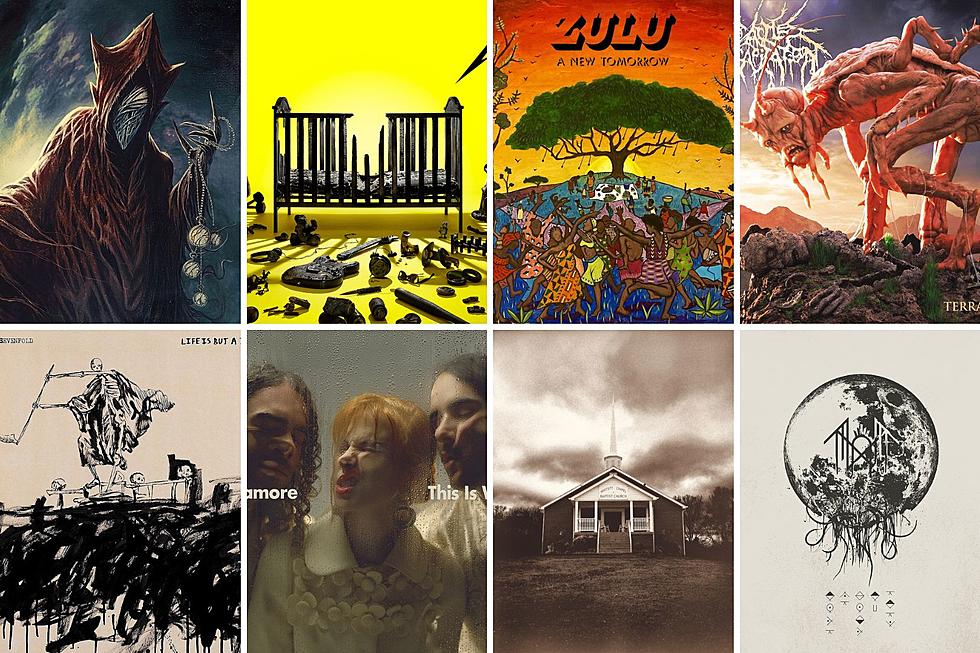![Overkill’s Bobby Blitz: Adaptation + Reinvention Fuels Longevity; Singer Talks ‘The Grinding Wheel’ [Interview]](http://townsquare.media/site/366/files/2015/10/Overkill-6.jpg?w=980&q=75)
Overkill’s Bobby Blitz: Adaptation + Reinvention Fuels Longevity; Singer Talks ‘The Grinding Wheel’ [Interview]
Overkill's Bobby Blitz was the latest guest on Full Metal Jackie's weekend radio program discussing the thrasher's new album, 'The Grinding Wheel.' The record is the 18th from the New Jersey icons and the frontman spoke about keeping their sound fresh with different dynamics, their work ethic, longevity, their punk influences and more. Check out the chat below.
It's like your eighteenth studio album. Bobby, what makes each time you record an album stand out as a unique experience?
Well, you know, I think one of the things about us is that we're really opportunists when it comes to this and we love to have new opportunities come our way, especially when we're the ones who have laid the groundwork for those opportunities, whether it be contracts, et cetera.
But then the passion comes in, and so you do all the work prior, you get the contract, you know what's coming and then you can switch it over to the passion end, which has always been the motivator here. We're really prideful guys. It's not about what we were, it's always about what we can do more from what we were and make it about what we were and make it about what we are. So I think that when an opportunity comes along and we get that chance, we really like to squeeze it and take it new places. And I think we've done it on this one too, it's got a great level of excitement for everyone in the band since it's been done.
It showcases a wide range of what Overkill can do. What's your most overlooked musical skill and why doesn't it come into play more often?
I like that, "Overlooked Overkill." And I think that you've touched something here, this does show diversity, there's more than a one trick pony here. And I think when I first started hearing D.D. [Verni, bass] presenting the riffs for this record; I heard a lot of traditional heavy metal in it. And it turns into thrash when we start adding the energy factor. You know, when you start pushing the energy button in the studio and everything starts going on 10+, that's when it becomes a thrash record.
But I'm hearing groove; I'm hearing the New Wave of British Heavy Metal. I'm hearing the punk rock we grew up on. I'm hearing epic vibes, I'm hearing some hardcore. I think the idea of the record as it developed was to have 10 individual entities on the record, but then at the end of the day — through the mix and through the development of the song, give it the Overkill stamp. The brand, right on the forehead.
Bobby, there's a real blue collar attitude to Overkill. Why is it important for your band to have that working class ethic?
I had this conversation with a guy when I was a kid. He goes, "Where you from?" and I said "Jersey", he goes, "That's where we in New York dump our garbage." And I said to myself "I will get that guy. (laughs) I will get that Manhattanite. He's probably from Indiana, but I'm gettin' him." I think it's something in the tri-state area, let's say immigration, or the first immigration hub of the United States of America, and my grandparents were both people, and my mother being first generation, I think a lot of those ethics were passed on as them being kind of 'New Americans', you know.
Sure, that happens in the current day also, and with newness comes a desire to succeed, and that desire to succeed was passed down to their offspring. And that would be me. That would be D.D Verni, that would be Dave Polinski, Ron, and Derek. So I think that we have that kind of coursing through our veins, that kind of "work hard and succeed" DNA. And obviously that's something that's passed on through family.
There's this tour coming up with Overkill and Nile. Overkill, an unbelievably good live band. What have you learned about getting that same power to come through on your studio albums?
You know, that's a trick. Cause it always hasn't happened, but it has been happening for a good amount of years. And my trick is to, you know, as we've gotten older, the chaos around it has settled down. Early on, it was just about chaos. We didn't know what we were doing, we were just doing it. But I think now we've kind of gotten to a point where we can think about it. And time becomes our luxury.
So what I do is I try to get the riffs as early as possible. I bring something that I can record on of high quality on the road. So if we're out on the road with Kreator, like we were a few years ago, or Symphony X, or now we're going out on the road with Nile, I'll have something on the bus to record on. Just an idea, throw it down.
I demoed an entire record on one tour, just because I wanted to take the stage, from the stage to the bus, to the recording. So for me that was my trick about getting that live energy into it. The last memory of Overkill being the stage, the first recording on the demo, right after that stage. So it's helped me a lot over these last few years.
Overkill has had a really long and productive career that shows no sign of slowing down. What would you have done different at the beginning if you anticipated this longevity?
[laughs] I can't even remember back that far, oh my god. I don't know because, everything changed. When we first walked into this, or actually forced our way into it, it was a different world. It was a world of vinyl and cassettes. Then the CD, so the changes all happened in the world around us. Now technology has brought us down to really digital information and it's a different world. I don’t know if anyone could have prepared for the music business from the '80s to 2017 because it has all — it was like almost from what it was to what it is.
But I do think along the way you must reinvent yourself. That's as simple as it is, you have to embrace the technology or get left behind. Then you become the old dog who knows one trick. I only know the old way. But I think one of the keys for us along the way is not to change what we learned from the beginning, but take it with and re-adapt and reinvent as we continue the journey. We all know here it's not about getting to the end, it's all about this journey and doing these shows and creating those records and having those experiences along the way. So, let's say adapt and reinvent throughout that journey.
Bobby, another band called Overkill was part of the Los Angeles punk scene at the same time that your band was beginning on the East Coast. How aware were you of them and the L.A. punk scene in general?
Well of course we were aware of it. They released I think simultaneous or very close to our first release and I think there was confusion from both camps, people either the metalheads or the people in that L.A. punk scene. I actually remember the record and own it, it's called The Triumph of the Will which came out in 1985 when our Feel the Fire [album] came out. We weren't that close to the L.A. punk scene.
But I can tell you, we were very close to the New York punk scene. When I went to Manhattan college in the Bronx, I was a one train, subway ride away from getting down to The Village. Being able to walk on the hallowed ground of CBGBs, Great Gildersleeves, The Mud Club even existed at that point. Max's of Kansas City. That is where a lot of our energetic inspiration came from. There were iconic bands from that era and area that existed whether it be The Ramones or I remember seeing Blondie on the street. Iggy Pop was living in New York. The Dead Boys came in from Cleveland and set up house in New York and I was also a big [New York] Dolls and Heartbreakers fan. So I think punk for sure influences this band, but I think it was more East Coast punk.
I'm guessing just a ton of touring scheduled for you guys for the rest of this year?
Business as usual is a good thing. Not saying it like it's boring, but it's business as usual. I was talking to a guy recently and he was like, "You've been touring for like 30 years." I said, "Well, I've actually been away from home for like 15." It's kind of where you belong. I remember one day doing a gig, I was parked somewhere in Tenn. and I got off the bus, I'm holding coffee and looking for a place to go. I look up and the building in front of me is purple, and it says on top "Worlds Largest Adult Bookstore" and I said to myself, "Yep, this is what it's all about." [laughs].
So I think that business as usual is a good thing. We're going to start with Nile in the U.S., Amorphis is going to join us for a few shows. Swallow the Sun will be on the majority of the tour, even Lordi will come in for one show so it'll almost be festival like. We look forward to a second European tour at the end of the year. Australia has been in the mix with Pacific Rim and South America just go confirmed. So it looks like business as usual is a good thing. Second U.S. run and we're all set.
Bobby, I always love chatting with you. Thank you.
Thank you!
Thanks to Bobby Blitz for the interview. Get your copy of Overkill's 'The Grinding Wheel' at the Nuclear Blast webstore and catch them on tour with Nile with a list of dates found here. Follow the band on Facebook to keep up with everything they're doing and find out where you can hear Full Metal Jackie’s weekend show at this location.
Where Do Overkill Rank Among the Top 50 Metal Bands of All Time?
Bobby Blitz Plays 'Wikipedia: Fact or Fiction?'
More From Loudwire









